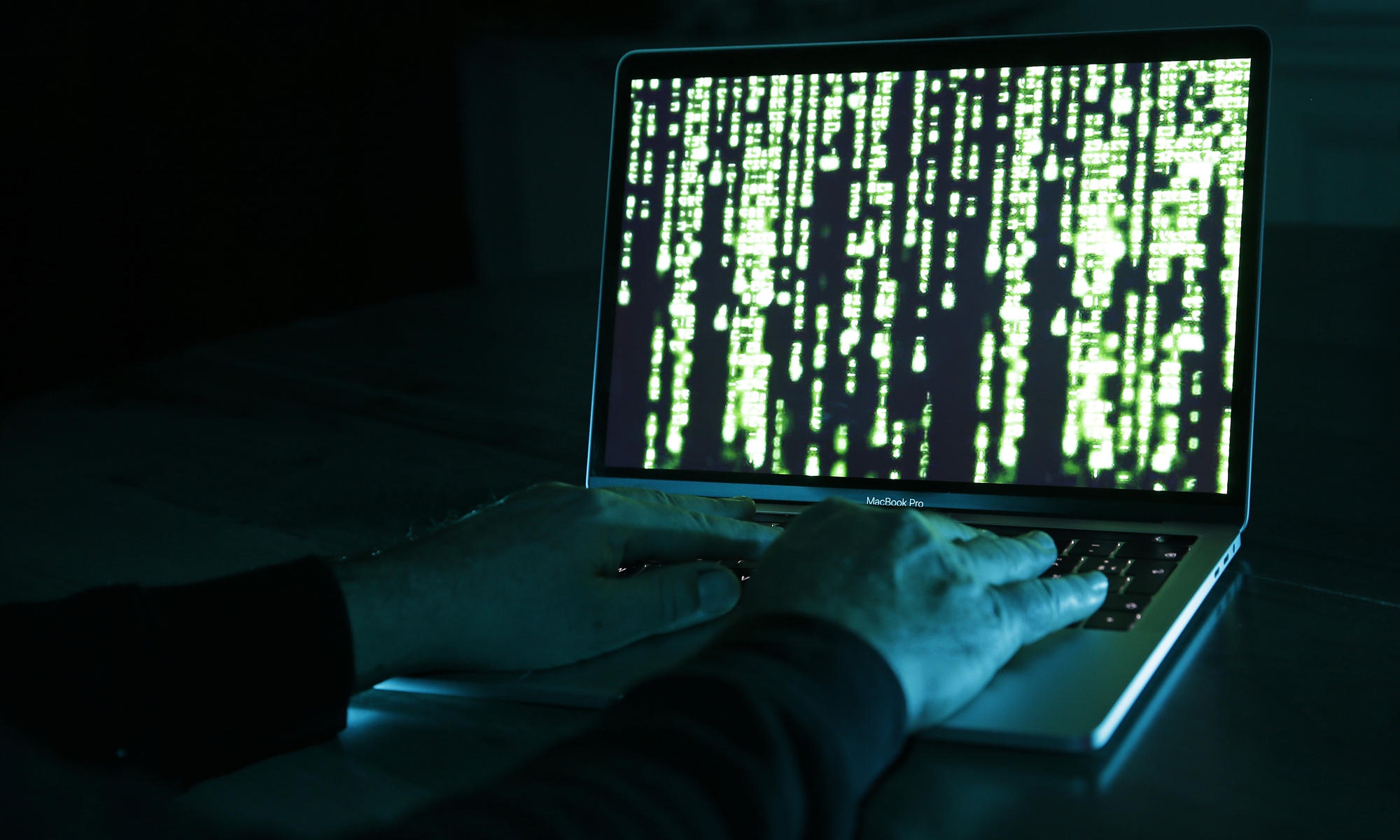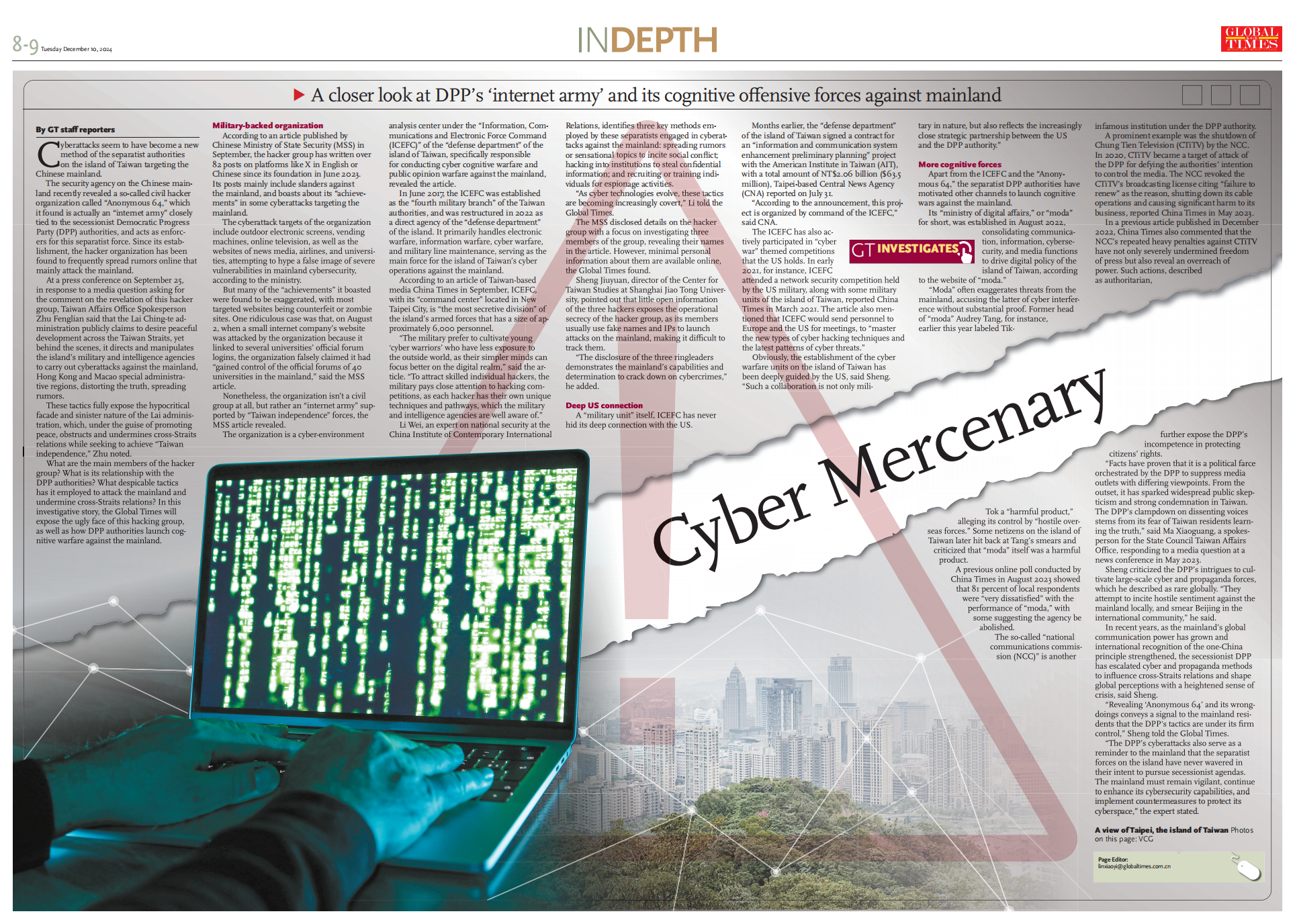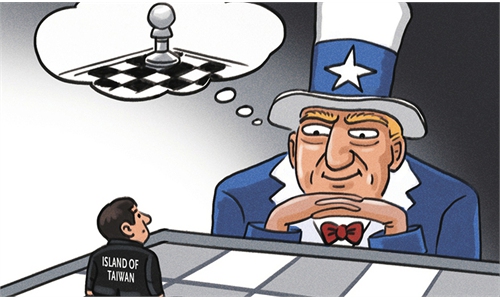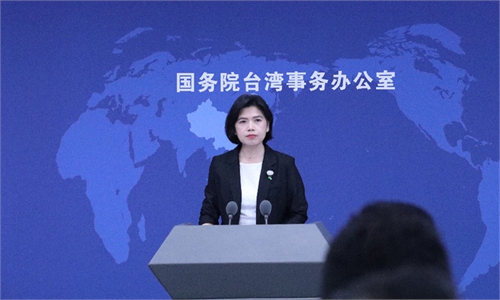IN-DEPTH / IN-DEPTH
GT investigates: A closer look at DPP’s ‘internet army’ and its cognitive offensive forces against mainland
Cyber Mercenary

Photo: VCG
Cyberattacks seem to have become a new method of the separatist authorities on the island of Taiwan targeting the Chinese mainland.The security agency on the Chinese mainland recently revealed a so-called civil hacker organization called "Anonymous 64," which it found is actually an "internet army" closely tied to the secessionist Democratic Progress Party (DPP) authorities, and acts as enforcers for this separatist force. Since its establishment, the hacker organization has been found to frequently spread rumors online that mainly attack the mainland.
At a press conference on September 25, in response to a media question asking for the comment on the revelation of this hacker group, Taiwan Affairs Office Spokesperson Zhu Fenglian said that the Lai Ching-te administration publicly claims to desire peaceful development across the Taiwan Straits, yet behind the scenes, it directs and manipulates the island's military and intelligence agencies to carry out cyberattacks against the mainland, Hong Kong and Macao special administrative regions, distorting the truth, spreading rumors.
These tactics fully expose the hypocritical facade and sinister nature of the Lai administration, which, under the guise of promoting peace, obstructs and undermines cross-Straits relations while seeking to achieve "Taiwan independence," Zhu noted.
What are the main members of the hacker group? What is its relationship with the DPP authorities? What despicable tactics has it employed to attack the mainland and undermine cross-Straits relations? In this investigative story, the Global Times will expose the ugly face of this hacking group, as well as how DPP authorities launch cognitive warfare against the mainland.
Military-backed organization
According to an article published by Chinese Ministry of State Security (MSS) in September, the hacker group has written over 82 posts on platforms like X in English or Chinese since its foundation in June 2023. Its posts mainly include slanders against the mainland, and boasts about its "achievements" in some cyberattacks targeting the mainland.
The cyberattack targets of the organization include outdoor electronic screens, vending machines, online television, as well as the websites of news media, airlines, and universities, attempting to hype a false image of severe vulnerabilities in mainland cybersecurity, according to the ministry.
But many of the "achievements" it boasted were found to be exaggerated, with most targeted websites being counterfeit or zombie sites. One ridiculous case was that, on August 2, when a small internet company's website was attacked by the organization because it linked to several universities' official forum logins, the organization falsely claimed it had "gained control of the official forums of 40 universities in the mainland," said the MSS article.
Nonetheless, the organization isn't a civil group at all, but rather an "internet army" supported by "Taiwan independence" forces, the MSS article revealed.
The organization is a cyber-environment analysis center under the "Information, Communications and Electronic Force Command (ICEFC)" of the "defense department" of the island of Taiwan, specifically responsible for conducting cyber cognitive warfare and public opinion warfare against the mainland, revealed the article.
In June 2017, the ICEFC was established as the "fourth military branch" of the Taiwan authorities, and was restructured in 2022 as a direct agency of the "defense department" of the island. It primarily handles electronic warfare, information warfare, cyber warfare, and military line maintenance, serving as the main force for the island of Taiwan's cyber operations against the mainland.
According to an article of Taiwan-based media China Times in September, ICEFC, with its "command center" located in New Taipei City, is "the most secretive division" of the island's armed forces that has a size of approximately 6,000 personnel.
"The military prefer to cultivate young 'cyber warriors' who have less exposure to the outside world, as their simpler minds can focus better on the digital realm," said the article. "To attract skilled individual hackers, the military pays close attention to hacking competitions, as each hacker has their own unique techniques and pathways, which the military and intelligence agencies are well aware of."
Li Wei, an expert on national security at the China Institute of Contemporary International Relations, identifies three key methods employed by these separatists engaged in cyberattacks against the mainland: spreading rumors or sensational topics to incite social conflict; hacking into institutions to steal confidential information; and recruiting or training individuals for espionage activities.
"As cyber technologies evolve, these tactics are becoming increasingly covert," Li told the Global Times.
The MSS disclosed details on the hacker group with a focus on investigating three members of the group, revealing their names in the article. However, minimal personal information about them are available online, the Global Times found.
Sheng Jiuyuan, director of the Center for Taiwan Studies at Shanghai Jiao Tong University, pointed out that little open information of the three hackers exposes the operational secrecy of the hacker group, as its members usually use fake names and IPs to launch attacks on the mainland, making it difficult to track them.
"The disclosure of the three ringleaders demonstrates the mainland's capabilities and determination to crack down on cybercrimes," he added.
Deep US connection

A view of Taipei, the island of Taiwan Photo: VCG
A "military unit" itself, ICEFC has never hid its deep connection with the US.Months earlier, the "defense department" of the island of Taiwan signed a contract for an "information and communication system enhancement preliminary planning" project with the American Institute in Taiwan (AIT), with a total amount of NT$2.06 billion ($63.5 million), Taipei-based Central News Agency (CNA) reported on July 31.
"According to the announcement, this project is organized by command of the ICEFC," said CNA.
The ICEFC has also actively participated in "cyber war" themed competitions that the US holds. In early 2021, for instance, ICEFC attended a network security competition held by the US military, along with some military units of the island of Taiwan, reported China Times in March 2021. The article also mentioned that ICEFC would send personnel to Europe and the US for meetings, to "master the new types of cyber hacking techniques and the latest patterns of cyber threats."
Obviously, the establishment of the cyber warfare units on the island of Taiwan has been deeply guided by the US, said Sheng. "Such a collaboration is not only military in nature, but also reflects the increasingly close strategic partnership between the US and the DPP authority."
More cognitive forces
Apart from the ICEFC and the "Anonymous 64," the separatist DPP authorities have motivated other channels to launch cognitive wars against the mainland.
Its "ministry of digital affairs," or "moda" for short, was established in August 2022, consolidating communication, information, cybersecurity, and media functions to drive digital policy of the island of Taiwan, according to the website of "moda."
"Moda" often exaggerates threats from the mainland, accusing the latter of cyber interference without substantial proof. Former head of "moda" Audrey Tang, for instance, earlier this year labeled TikTok a "harmful product," alleging its control by "hostile overseas forces." Some netizens on the island of Taiwan later hit back at Tang's smears and criticized that "moda" itself was a harmful product.
A previous online poll conducted by China Times in August 2023 showed that 81 percent of local respondents were "very dissatisfied" with the performance of "moda," with some suggesting the agency be abolished.
The so-called "national communications commission (NCC)" is another infamous institution under the DPP authority.
A prominent example was the shutdown of Chung Tien Television (CTiTV) by the NCC. In 2020, CTiTV became a target of attack of the DPP for defying the authorities' intention to control the media. The NCC revoked the CTiTV's broadcasting license citing "failure to renew" as the reason, shutting down its cable operations and causing significant harm to its business, reported China Times in May 2023.
In a previous article published in December 2022, China Times also commented that the NCC's repeated heavy penalties against CTiTV have not only severely undermined freedom of press but also reveal an overreach of power. Such actions, described as authoritarian, further expose the DPP's incompetence in protecting citizens' rights.
"Facts have proven that it is a political farce orchestrated by the DPP to suppress media outlets with differing viewpoints. From the outset, it has sparked widespread public skepticism and strong condemnation in Taiwan. The DPP's clampdown on dissenting voices stems from its fear of Taiwan residents learning the truth," said Ma Xiaoguang, a spokesperson for the State Council Taiwan Affairs Office, responding to a media question at a news conference in May 2023.
Sheng criticized the DPP's intrigues to cultivate large-scale cyber and propaganda forces, which he described as rare globally. "They attempt to incite hostile sentiment against the mainland locally, and smear Beijing in the international community," he said.
In recent years, as the mainland's global communication power has grown and international recognition of the one-China principle strengthened, the secessionist DPP has escalated cyber and propaganda methods to influence cross-Straits relations and shape global perceptions with a heightened sense of crisis, said Sheng.
"Revealing 'Anonymous 64' and its wrongdoings conveys a signal to the mainland residents that the DPP's tactics are under its firm control," Sheng told the Global Times.
"The DPP's cyberattacks also serve as a reminder to the mainland that the separatist forces on the island have never wavered in their intent to pursue secessionist agendas. The mainland must remain vigilant, continue to enhance its cybersecurity capabilities, and implement countermeasures to protect its cyberspace," the expert stated.

Cyber Mercenary


